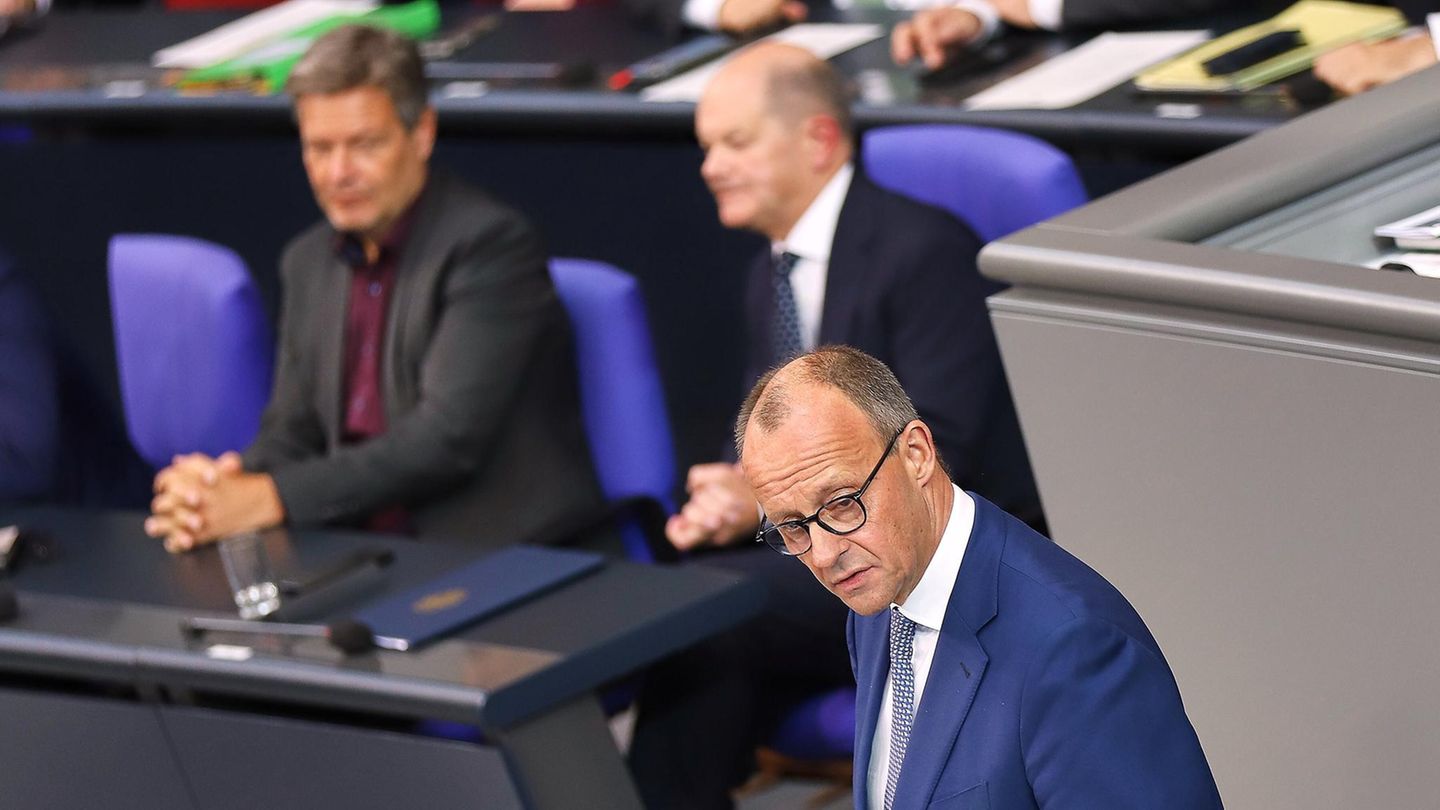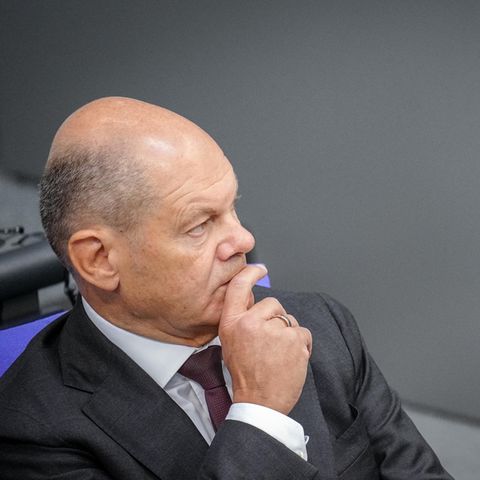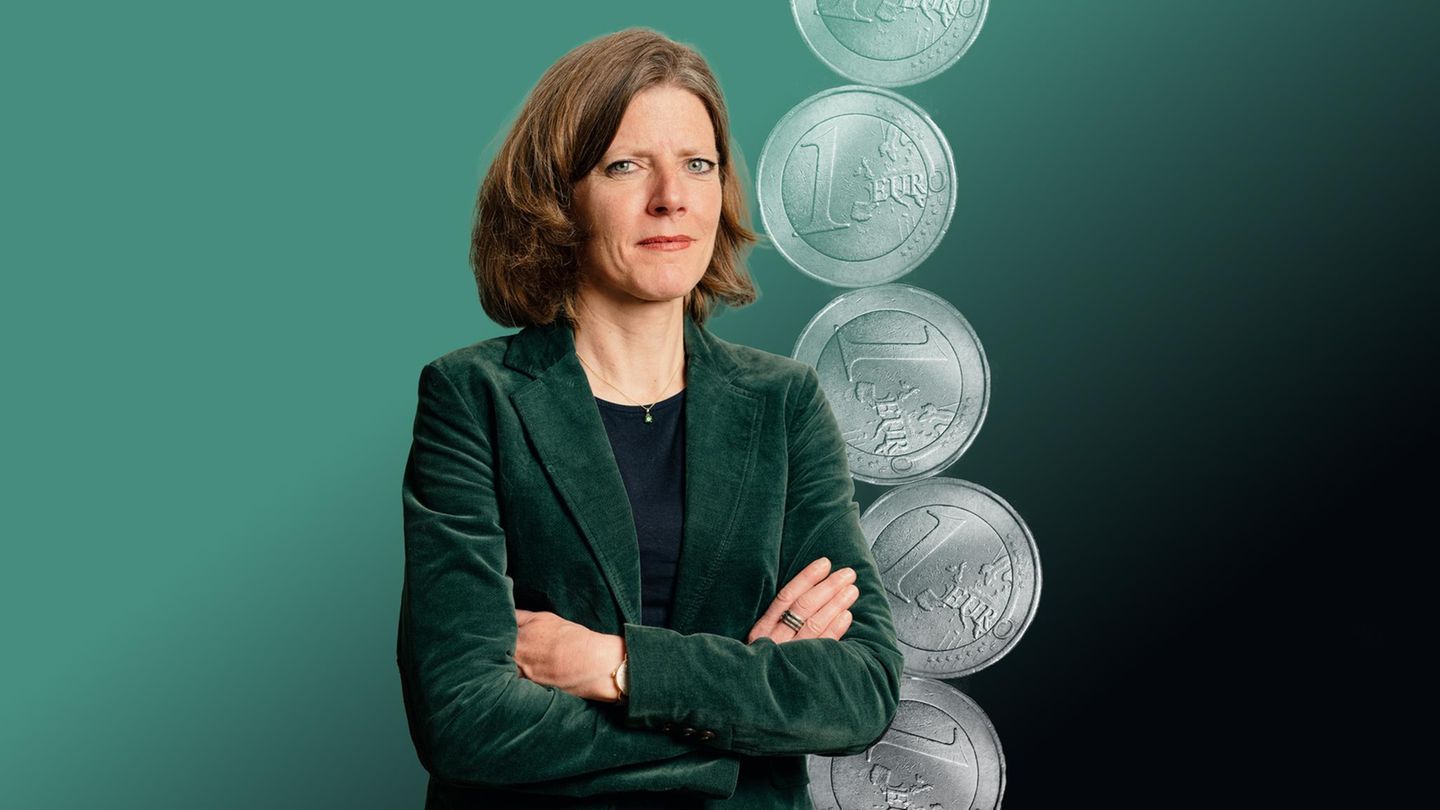New election poker
With these 113 laws, Friedrich Merz is open to blackmail
Copy the current link
The Chancellor initiates the new election earlier, and the pressure is growing on the Union and Friedrich Merz to quickly agree to important laws. It’s a gigantic number.
Friedrich Merz was tough: Until the SPD Chancellor had asked the vote of confidence, he did not want to discuss traffic light laws in the Bundestag. The CDU chairman said that again and again. But now that Olaf Scholz has given in and wants to start the new election process on December 16th, there is no longer any excuse for the opposition leader.
There are many of the 113 laws that are currently open that he should not block as a party tactic. If some of the outstanding laws are not implemented, Merz would face an uprising within its own ranks. FDP leader Christian Lindner is also threatening to damage himself again.
The number is also gigantic for Berlin’s busy political scene: a total of 113 legislative proposals are stuck in a political no-man’s land after the traffic light yellow phase was switched off. Because if the Bundestag is dissolved, the “discontinuity principle” comes into play: Anything that has not been passed will automatically be completely eliminated and would have to be started all over again.
Some of the outstanding bills definitely no longer have a chance. Olaf Scholz, for example, no longer wants to put the pension reform to the vote in the Bundestag, but rather in the federal election. Basic child welfare, the Greens’ only social policy project, has also already been written off. The same applies to the so-called Democracy Promotion Act. And: Because the federal budget for 2025 will no longer be passed, some projects lack the necessary legal basis to be able to spend money on planned things.
But there are also many laws in the mountain of projects that the Union’s Prime Ministers would actually like to have. And some that the FDP itself pushed forward shortly before the end. There are also those that Germany has to implement due to EU requirements. Otherwise there is a risk of EU fines.
Income tax: more net than gross
Merz is in a quandary, especially when it comes to the 2025 annual tax law. Because this means, among other things, that the income tax rate is “shifted to the right”. This means that the basic tax allowance will be increased by law, meaning everyone will pay a little less tax than if the rate remained the same.
If that doesn’t happen, citizens will have to hand over more of their wage increases to the state treasury in 2025. If necessary, the FDP party leader Christian Lindner has signaled, the FDP could still save this law across the finish line in the Bundestag. But Merz would have to ask himself whether this is his understanding of responsible politics.
So that the light doesn’t go out: Habeck’s power plant strategy
In the medium term, Germany should switch almost entirely to CO₂-friendly power plants with renewable energy – this was the goal of the traffic light and, above all, Economics Minister Robert Habeck. On the way there, the climate killer coal-fired power plants in particular have to go. But in order to be able to generate electricity even in the dark, other power plants are needed: gas power plants. They can be switched on and off quickly and will later run on hydrogen.
But the construction takes years – which is why the Power Plant Safety Act, which is intended to determine the construction, is so central. The southern federal states and their prime ministers in particular want planning security quickly – while Friedrich Merz continues to believe in a revival of nuclear power plants. Industry representatives have long since confirmed that this won’t work.
But without the Power Plant Safety Act, the dozens of necessary “hydrogen-ready” gas power plants will probably, above all, not be built. But some of them are to be built by the municipal utilities – and behind them there are also municipalities in which CDU and CSU politicians have the say. Blocking this would be an internal problem for Friedrich Merz.
Digital Pact 2.0: No money for digital education
The digital pact was intended to make students and schools fit for the digital age. The money is gone, now there should be a follow-up regulation. All over the country there is a risk that computers and tablets will break and no replacements can be found. Because the municipalities, which are actually responsible for this, often have no money for it.
That’s why there should be a new edition of the digital pact. But the negotiations between the then Federal Education Minister Bettina Stark-Watzinger (FDP) and the states made slow progress – the remainder of the five billion euros of the first pact will expire at the end of 2024 if no follow-up solution is found.
A broad alliance demands: The interim education minister Cem Özdemir (Greens) and the state ministers must find a solution immediately. But the time for this is really short – probably too short. Practical: Here the Union can pin the blame on the FDP, whose education minister failed to find a solution in the traffic light government for years.
Security: The crucial question for the Union
A big problem for the Bundeswehr is the lack of planning security due to the lack of a budget for 2025. Instead of continuing to rearm, it is now a matter of standing still. At least if the money doesn’t come from the special fund. Not exactly what the Bundeswehr needs in these times – but the troops are practiced in waiting for better times.
At another point, however, waiting is really problematic. The Union also wants to permanently station a brigade of Bundeswehr soldiers in Lithuania. The soldiers should go there voluntarily – thanks, among other things, to an allowance for deployment abroad, separation pay and other incentives. But the “Law to further strengthen personnel readiness and to change regulations for the Bundeswehr” has not even passed its first reading in the Bundestag. Can the Union afford to say no across the board here? Or will the FDP stand behind the law again? Financially it is manageable: in 2025 it will be around 40 million euros. But if it doesn’t happen, the soldiers know exactly who they can thank for it.
Agriculture: Things are looking bad for the farms
This project seems small, but is really urgent – and affects a core clientele of the Union: If a farm is inherited, it often has to be divided between several heirs: one gets the farm, the others a share of the value. Until now, this value was determined using the old property tax.
But the Federal Constitutional Court declared it unconstitutional in 2018. There is now a risk of a regulatory gap here: from January 2025, if the law does not come into effect, the exact value will have to be calculated – this should actually be prevented. How Friedrich Merz wants to explain this to the farmers who are traditionally strong in the Union? Unclear.
Asylum policy: Implementation of EU laws is canceled
In November 2023, the EU’s new common asylum policy was decided – and two important laws for implementation in Germany are stuck. The federal government wanted to be able to apply the new rules as quickly as possible and be ready to go. The Union also wants to implement this.
However, at least parts of the Union would like to take further steps to make an asylum application in Germany as unattractive as possible – up to and including the abolition of the asylum article in the Basic Law, which was brought into play by Saxony’s Prime Minister Michael Kretschmer in the summer. However, if the Union refuses to implement the common asylum regulations into German law or postpones them, it will have to explain what exactly it wants instead – and this is by no means uncontroversial within the Union.
Anti-AfD blockade law: That’s almost certainly coming
Another important project for the Union and FDP would not be easy to explain: In a joint application with the traffic light coalition, the CDU and CSU introduced changes to two articles of the Basic Law and to the law on the Federal Constitutional Court at the end of September.
The express goal: If the AfD or another party adopts a blocking stance in the election of judges for the Federal Constitutional Court, a replacement mechanism should come into force so that the highest court always remains operational. Saying no here is out of the question.
Friedrich Merz will have to move
There are a lot of important projects that are putting pressure on the Union Chancellor candidate. Now that Olaf Scholz has moved, he will have to move too. Otherwise he will risk his election chances. And the chancellorship.
Source: Stern
I have been working in the news industry for over 6 years, first as a reporter and now as an editor. I have covered politics extensively, and my work has appeared in major newspapers and online news outlets around the world. In addition to my writing, I also contribute regularly to 24 Hours World.






